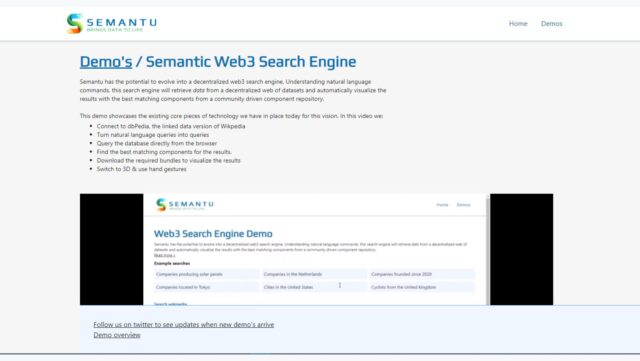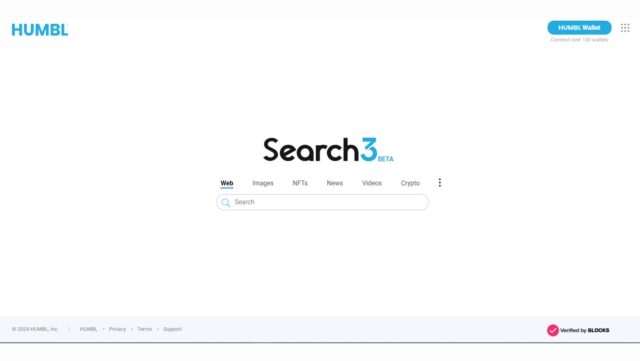The way we navigate the vast ocean of information online is on the verge of a revolution.
As Web3 technology continues to reshape the internet, Web3 search engines are emerging to offer an alternative to the status quo. But what exactly are Web3 search engines, and how do they differ from the search giants we’re accustomed to?
Traditional search engines, like the ones we use daily, are built on a centralized model. This means a single entity controls the infrastructure, crawls, and indexes the web, and determines how search results are ranked and displayed.
While these search engines have undoubtedly revolutionized information access, they raise concerns about privacy, data security, and censorship.
Web 1.0 to Web3.0: A Shift in Search
Let’s take a quick trip down memory lane. Web 1.0, the primitive stage of the internet in the 1990s, was characterized by static web pages.
Information was limited and extremely difficult to find. Imagine this technology as a vast library with dusty, hand-written catalogs organized by subject.
To find information specifically related to your interest, you would need to spend a lot of time flipping through pages to find the specific information you were looking for.
Web 2.0, the era we’re in, ushered in a period of dynamic content and user interaction. Social media platforms exploded, and search engines became much more sophisticated.
Complex algorithms crawled and indexed the ever-growing web, making information retrieval significantly faster and more efficient.
Web 3.0, also known as the decentralized web, hasn’t been fully imagined but promises a more user-centric experience.
Here’s where Web3 search engines come into play as they leverage blockchain technology and artificial intelligence (AI) to prioritize privacy, transparency, and user control over data.
Why Web3 Search Engines?
Traditional search engines have served us well, but they come with limitations. They track user data, filter results based on past behavior, and often lead to a biased view of information.
Web3 search engines aim to solve these issues by leveraging blockchain technology to offer a more transparent and user-controlled experience.
Also, they are designed to crawl and index decentralized web spaces, which might be overlooked by traditional search engines.
This includes content from decentralized applications, non-fungible tokens, and other decentralized services that are part of the Web3 ecosystem.
By doing so, they provide visibility to a segment of the internet that is growing in both size and importance.
Top Web3 Search Engines to Explore
Here are the top web3 search engines to explore in 2024: They are a good start for anyone looking to become invested in the world of web3.
- Presearch
- Semantu
- Humbl
- Web3 Compass
Presearch

Presearch stands out as a major contender in web3 search engines. It prides itself on being a decentralized search engine, built to empower users, protect their privacy, and offer a superior search experience
Unlike Google or Bing, the traditional search engines that track your searches, Presearch doesn’t. You control your search experience and choose your preferred search engine within Presearch.
Here are some unique features of the presearch web3 search engine:
- Ad-Free: Presearch provides a mostly ad-free platform, which means you won’t see personalized ads as you would on traditional search engines.
- Customizable: Users can now customize their search experience, including settings for local search results based on IP geolocation, opening links in new tabs, and enabling a safe search filterhttps://presearch.com/.
- Open-Source: As an open-source platform, Presearch values transparency and collaboration, allowing users and developers to contribute to its development.
- AI Results: The search engine includes an option to show AI-generated results, enhancing the search experience with intelligent responses.
- Mobile Apps: Presearch offers official mobile applications for both Android and iOS devices, making them accessible on the go.
Access Presearch here: Presearch
Semantu

Semantu isn’t quite a fully functional web3 search engine yet, but it’s an interesting project with the potential to become one.
This breakthrough piece of technology is making waves with its search capabilities. It understands the context and intent behind queries, providing more accurate and relevant results.
Here’s what we know about Semantu:
- Focus on Data: Semantu’s core strength lies in its ability to understand and connect data. It uses semantic technology to interpret the meaning behind your searches, not just keywords.
- Intelligent Applications: Their goal is to be a platform for building intelligent Web3 applications. Imagine drag-and-drop app creation with reusable components that leverage Semantu’s data understanding.
- Decentralized Search Vision: While not fully realized yet, Semantu envisions a future where it becomes a decentralized Web3 search engine. This would involve a network of data sources, allowing for a more distributed and potentially censorship-resistant search experience.
- Natural Language Search: Semantu aims to understand natural language queries. This means you could ask questions more conversationally and get results that reflect the true intent of your search.
- Data Visualization: Imagine a search engine that not only returns text results but also automatically generates visualizations to help you understand the information better. Semantu aspires to do just that.
Access Semantu here: Semantu
Humbl

Humbl’s Web3 search engine, aptly named Search3, aims to be a user-friendly gateway to the decentralized web. Here’s what makes Search3 stand out:
-
Simplifying Web3 Exploration: Search3 recognizes the complexity of Web3 for newcomers by providing a simplified interface for users to explore resources on web3. This can be particularly helpful for those unfamiliar with navigating the intricacies of blockchain technology.
-
NFT Search: A key feature of Search3 is its ability to search for NFTs (non-fungible tokens) across different blockchains. You can search by wallet address, contract address, or specific keywords to find the NFTs you’re interested in.
-
Integration with Humbl Wallet: Search3 is also designed to work with the Humbl Wallet, a digital wallet app by the same company. This gives a more streamlined user experience for actions like buying or selling NFTs directly from search results (although this functionality might be in development).
-
Public Launch: Unlike Semantu, Search3 is a live product. It launched in beta in May 2022 and has been evolving since then. You can access it using the link below.
Access Humbl here: Humbl
Web3 Compass

Web3 Compass also stands out as a web3 search engine specifically designed to navigate the decentralized web. Web3 Compass goes beyond the traditional Domain Name System (DNS) used by most websites.
It can search websites hosted on the InterPlanetary File System without hitches. Other features include:
-
Blockchain Domain Compatibility: Web3 Compass recognizes and can search using blockchain domain names like those offered by Unstoppable Domains (“.blockchain”, “.bitcoin”, “.eth”) and the Ethereum Name Service (ENS). This expands your search reach to websites built on these decentralized naming systems.
-
Historical Blockchain Data: Web3 Compass isn’t limited to current information. It indexes historical blockchain data, allowing you to track changes and analyze past events within the Web3 ecosystem.
-
Privacy Considerations: While there isn’t as much emphasis on privacy as with some other web3 search engines, Web3 Compass doesn’t explicitly state tracking user searches or selling data to advertisers.
Access Web3 Compass here: Web3 Compass
Decentralization: A Core Principle
Web3 search engines operate on the principles of decentralization. Unlike their Web2 counterparts, they don’t rely on a central authority to index and retrieve information.
This approach enhances privacy and prevents censorship and manipulation of search results.
Not only that, they also empower users with the ability to contribute to and verify the indexing process. This collective participation ensures a diverse range of information sources and viewpoints, creating an ecosystem where information is not monopolized by a single entity.
See also: Blockchain Nodes: The Backbone of Decentralized Networks